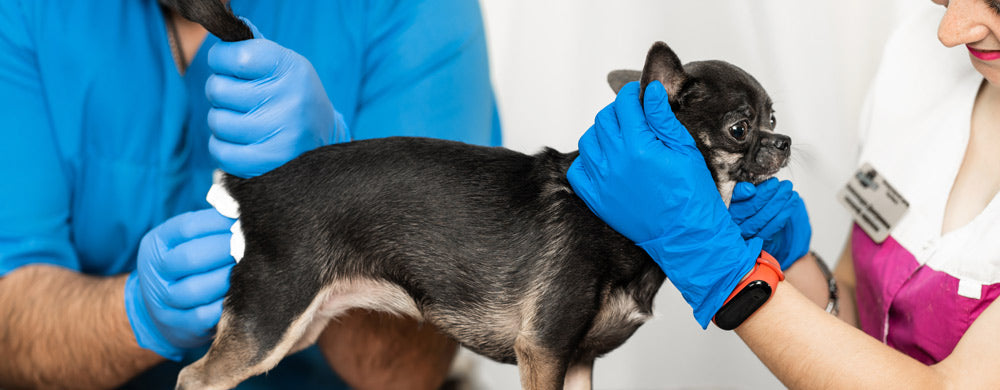Your basket is empty

Should I Give My Dog Fish Oil? Omega 3, 6, and 9 Explained
August 13, 2020 6 min read
Fish oil is advantageous for dogs, but you might have wondered whether it’s truly necessary in their diets.
As dogs are unable to produce omega-3 and omega-6 themselves, fish oil is an excellent way to make sure your dog gets all the nutrients they need to be healthy. This is especially true if your dog doesn’t get either of these fatty acids from their food.
What Is Fish Oil?
Fish oil is fat or oil extracted from fish tissue. It’s typically taken from fish like anchovies, tuna, mackerel, herring, or other types of oily fish. Fish oil supplements for dogs consist of two fatty acids: EPA (eicosapentaenoic acid) and DHA (docosahexaenoic acid).
Dogs don’t make either of these omega-3 acids in large quantities, which is why fish oil supplements can be a great addition to their diet.
---
Is Fish Oil Good for Dogs? Benefits of Fish Oil
Giving your dog fish oil has a number of benefits, including healthier skin, improved immune function, and evenreduction of the growth of certain cancers.
- EPA, one of the omega-3 fatty acids found in fish oil, has anti-inflammatory properties, so it helps reduce swelling or pain associated with a few different conditions, including arthritis.
- It helps give your dog a shiny and healthy coat, as well as reduce shedding.
- Dogs with allergies can benefit from fish oil as it reduces inflammation, dandruff, and itchy skin. Additionally, if your dog regularly has hot spots (infected skin that appears red, wet, or raised), then fish oil can be a good prevention method.
- DHA, the second type of omega-3 fatty acid found in fish oil, is vital for cognitive and neurological development in puppies. Supplementing fish oil to pregnant or nursing dogs can be hugely advantageous to the puppies.
- Omega-3 keeps cartilage and collagen healthier for longer, which can improve mobility in dogs with osteoarthritis.
- Elderly dogs, puppies, or dogs recovering from an illness benefit from omega-3 as it helps support their immune system.
- Essential fatty acids are key to cell growth and maintenance in dogs.
- Omega-3 helps support your dog’s liver, eyes, kidneys, and heart.
- There have been studies of fish oil potentially slowing the growth and development of certain cancers in dogs. A 2000 study, in particular, looked at 32 dogs with lymphoma. The supplementation of fish oil in each dog’s diet drastically increased their survival rate and disease-free intervals.
As you can see, there are many advantages to feeding your dog fish oil and making it a component of their daily nutrition.
---
Healthy Sources of Omega-3 Fatty Acids
There are many healthy sources of omega-3 fatty acids for dogs. Fish oils that contain EPA and DHA, particularly from coldwater fish like sardine, mackerel, salmon, and herring are the main dietary sources of omega-3. Animals that feed on these fish are also sources of this fatty acid.
Eggs that come from chickens that are fed omega-3 are another source of DHA. And lastly, ALA located in sources like canola, flaxseed, pumpkin, leafy green vegetables, kidney beans, provide ALA (alpha-linolenic acid).

(Image by MySpiritSphere)
---
How Much Omega-3 Fatty Acids Should I Give My Dog?
The amount of omega-3 fatty acids you give your dog each depends on their weight, age, activity level, joint health, and whether they have any allergies.
According to Dr. Bauer, the maximum daily dose for dogs with osteoarthritis is 310mg of fish oil per 0.75kg of body weight. It’s important to note that this amount isn’t tolerated by all dogs, so you might want to consider a lower dose initially before gradually increasing it.
Make sure you speak to your vet before you give your dog any supplements, especially if they are taking any prescription anti-inflammatory medication. Let your vet know immediately if you notice your dog behaving abnormally after consuming fish oil.
---
Can Dogs Get Too Much Omega-3?
While it’s no doubt that omega-3 is very advantageous for dogs, there is a limit to the amount you can give them. Too much omega-3 in your dog’s diet can do more harm than good, so don’t go overboard.
Omega-3 is an anti-inflammatory, whereas omega-6 has inflammatory properties. Although both are vital to your dog’s health, they can reduce the effectiveness of one another, so proper dosing is important.
Giving your dog too much omega-3 can also cause a lot of unpleasant side effects, such as vomiting, diarrhoea, reduced wound healing, weight gain, and altered platelet function. It’s important to only feed your dog the recommended amount of fish oil based on the manufacturer’s instructions.
---
What’s the Difference Between Omega-3, -6, and -9?
Fats are named after the number of unsaturated bonds they have in their chain. For example, saturated fats don’t have any unsaturated bonds, while monounsaturated fats have one that happens at the ninth double bond. That’s why monounsaturated fats are referred to as omega-9 fatty acids.
Omega-3 and omega-6 are both essential fatty acids and are vital in your dog’s diet. As dogs cannot produce either of these themselves, they can only receive them through food or supplements.
Omega-9 is considered a non-essential fatty acid and isn’t as important as omega-3 or -6, but it helps with your dog’s immune function.
---
What Omega Fatty Acids Are Necessary?
 Omega-3 and omega-6 are necessary in your dog’s diet as they lack the ability to make them on their own. The only way dogs can get these fatty acids is through food or supplements like fish oil.
Omega-3 and omega-6 are necessary in your dog’s diet as they lack the ability to make them on their own. The only way dogs can get these fatty acids is through food or supplements like fish oil.
Although omega-9 isn’t as vital in your dog’s diet as the other two, it’s still beneficial for a healthy immune system.
 Dog’s Lounge has two great fish oil supplements to offer - OMEGA and SALMA. OMEGA contains all three of these omega fatty acids to provide your dog with the essential nutrients they can’t make by themselves. OMEGA supplement comes in soft gel tablets, making them easy to swallow and digest. SALMA contains mostly omega 3 fatty acids and antioxidants. It is a Scottish salmon oil in a liquid form.
Dog’s Lounge has two great fish oil supplements to offer - OMEGA and SALMA. OMEGA contains all three of these omega fatty acids to provide your dog with the essential nutrients they can’t make by themselves. OMEGA supplement comes in soft gel tablets, making them easy to swallow and digest. SALMA contains mostly omega 3 fatty acids and antioxidants. It is a Scottish salmon oil in a liquid form.
Our supplements are manufactured in the UK to GMP code of practice and ISO 9001 Quality Assurance Certification.
---
Storage and Care of Fish Oil
Fish oil supplements come in two forms: soft gels (liquid gels) or liquids. No matter which type of fish oil you give your dog, it’s important to store it correctly to increase its shelf life and prevent oxidation.
Oxidation is when oil reacts with oxygen and causes a chain of undesirable chemical reactions to occur. This process eventually causes the oil to spoil.
All oils are at risk of oxidation, but fish oil is the most susceptible. Both EPA and DHA are polyunsaturated fatty acids and have multiple double bonds as a result. The double bonds can readily react with oxygen, which creates a bad fishy flavour and odour.
Liquid fish oil goes off a lot quicker than capsules once it has been opened as it lacks a casing. This means it’s exposed immediately to air. You should always store liquid fish oil in a refrigerator after you’ve broken the seal on the container as cold temperatures slow down oxidation.
Fish oil capsules, on the other hand, can be stored at room temperature away from bright light or high heat. The majority of fish oil supplements have a maximum shelf life of 24 months if they are unopened and have been stored correctly.
---
How Long Does It Take for Oxidation to Occur in Fish Oil?
Oxidation happens once fish oil comes into contact with oxygen. So, in other words, it can occur as soon as you open it. However, storing fish oil away from light and at the correct temperature can slow down this process.
Remember, liquid fish oil should be kept in a refrigerator once opened, while capsules can be left at room temperature.
---
How Do I Know If Fish Oil Has Gone Bad?
It’s quite easy to tell when fish oil has gone bad simply by smell. Fresh fish oil has no fishy taste or odour, similar to fresh fish. If there is a distinct fishy scent to your dog’s fish oil, then it’s likely gone rancid and should be thrown away.
---
FINAL THOUGHTS
So, is fish oil good for dogs? To sum up, omega-3 and omega-6 fatty acids are both essential in your dog’s diet as they can’t produce them on their own. Fish oil supplements are a great way for ensuring your dog isn’t deprived of either of these fatty acids.
Our OMEGA fish oil supplement contains omega 3, 6, and 9 to provide your dog with a wealth of benefits to keep them happy and healthy.
Also in Pet Advice

Should You Add Water to Your Dog’s Kibble? Here’s What the Science Says
August 14, 2025 7 min read
Should you add water to your dog’s kibble? Discover the science-backed pros, cons, and better alternatives like bone broth and fresh food to improve hydration, digestion, and overall canine health...

DIY Frozen Dog Treats Your Pup Will Love
June 27, 2025 4 min read
Summer heat can be dangerous for dogs, making hydration more important than ever. Learn how to spot signs of dehydration, boost your pup’s water intake, and create fun, frozen recipes to keep them happy and healthy all season long.

Why Is My Dog Scooting? Common Causes and How Diet Can Help
May 09, 2025 4 min read
If your dog is scooting or smells fishy, it could be due to blocked or irritated anal glands. Learn what causes blocked anal glands, which dogs are most at risk, and how simple dietary changes—like adding fibre and anti-inflammatory nutrients—can help prevent recurring problems.
Search our shop
In this article
- What Is Fish Oil?
- Healthy Sources of Omega-3 Fatty Acids
- How Much Omega-3 Fatty Acids Should I Give My Dog?
- Can Dogs Get Too Much Omega-3?
- What’s the Difference Between Omega-3, -6, and -9?
- What Omega Fatty Acids Are Necessary?
- Storage and Care of Fish Oil
- How Long Does It Take for Oxidation to Occur in Fish Oil?
- How Do I Know If Fish Oil Has Gone Bad?
- FINAL THOUGHTS
